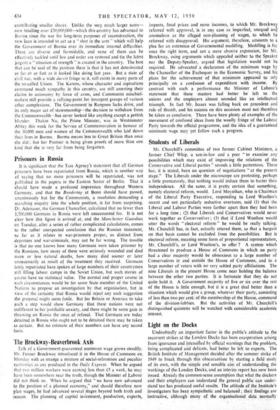Prisoners in Russia
It is significant that the Tass Agency's statement that all German prisoners have been repatriated froni Russia, which is another way of saying that no more prisoners will be repatriated, was not published in the papers in the Eastern Sector of Berlin. That it should have made a profound impression throughout Western Germany, and that the Bundestag at Bonn should have passed, unanimously but for the Communists, a resolution demanding a searching enquiry into the whole position, is far from surprising. Dr. Adenauer, the German Chancellor, calculated that no fewer than 1,500,000 Germans in Russia were left unaccounted for. It is not clear how this figure is arrived at, and the Manchester Guardian on Tuesday, after a series of rather complicated calculations, comes to the rather unexpected conclusion that the Russian statement, so far as it relates to war-prisoners proper, as distinct from deportees and war-criminals, may not be far wrong. The trouble " is that no one knows how many Germans were taken prisoner by the Russians,-how many of these were seriously wounded and died more or less natural deaths, how many died sooner or later unnecessarily as result of the treatment they received. Germans lately repatriated have spoken of large numbers of their countrymen still filling labour camps in the Soviet Union, but such stories of course have no statistical value. The normal and proper course in such circumstances would be for some State member of the United Nations to propose an investigation by that organisation, but in view of the certainty that-Russia would reject any such suggestion the proposal might seem futile. But for Britain or America to take such a step would show Germany that these nations were not indifferent to her justifiable anxiety, and there might be some gain in throwing on Russia the onus of refusal. That Germans are today detained in Russia who ought not to be detained there may be taken as certain. But no estimate of their numbers can have any sound basis.






































 Previous page
Previous page